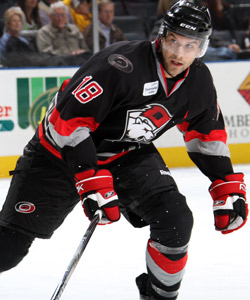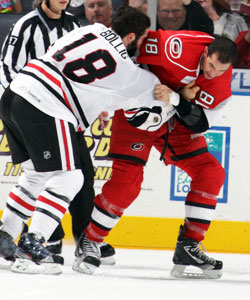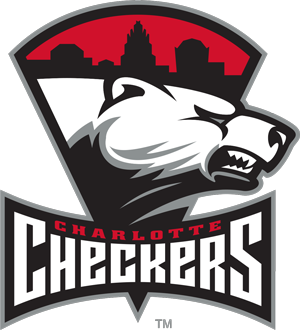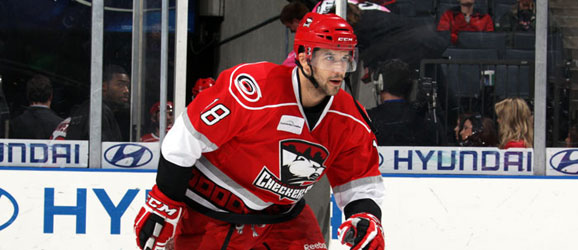Because of that leg injury, one that he attempted to play though this past season, the Checkers’ enforcer for the last two seasons announced his retirement as a player earlier this week. It was announcement that was a long time coming, the fulfillment of initial predictions.
“When I first heard from the doctor who said there was a pretty good chance it was a career-ending injury, as a hockey player you expect to battle through anything,” he said. “I didn’t really listen to it.”
Once he returned for what he expected to be a bounce-back season, he knew.

When Soryal, who accumulated 697 penalty minutes over five AHL seasons, left the Checkers’ lineup for good this March, it wasn’t because a new injury had occurred. It was because he finally came to terms with what his body had been telling him all season, when he experienced pain and swelling after long flights, during pre-game soccer warm-ups, or, sometimes, just from walking.
“I had a meeting with JD and Geordie and laid it all out that I was in quite a bit of pain and felt I wasn’t going to be able to contribute to the team,” said Soryal, referring to Checkers coaches Jeff Daniels and Geordie Kinnear. “They were awesome and they understood. They couldn’t have been better about it. I think it was something they probably already knew, but I think they appreciated that I was honest about it.”
Soryal said that the pain, along with his range of motion, has improved since he underwent a second medical procedure soon after his decision to quit playing. He still expects to have a knee replacement somewhere down the road, but, “Not when I’m 26.’”
Still, things have not improved to the point where he feels he can continue playing. Aside from his skating, the injury – deemed a tibeal plateau fracture – compromised his ability to perform his primary role.
“My first fights of the season against (Jay) Rosehill and (Brandon) Bollig, they punch a lot with both hands so there’s a lot of turning and I felt like I was losing my balance the whole time,” said Soryal. “It’s always a risky job, so to take away one of your best assets is no good. It’s not like I’m a 6-6 guy that can just stand there and throw. I’ve got to keep moving.”
A quick perusal of Soryal’s game history this season tells the story. Amid sitting out most of the team’s games as a healthy extra during NHL’s lockout, he fought four times in his first seven games, par for the course. However, a bout with Lake Erie’s Patrick Bordeleau on Jan. 4, his second of the game, resulted in a concussion. It would be his last fight as a professional, even though he played 21 more games.
“As much as you tell yourself to tough it out, it would have been stupid for the team and stupid for me,” he said. “No one wants to see their fighter get beat.”
Looking back on the injury that led to his retirement, Soryal still isn’t quite sure how it happened. It was hardly a violent collision, and an accidental one at that, with Chicago forward Mike Duco on March 11, 2012. More than anything else, it was simply the result of one big man falling on top of another.
“He’s as tall as he is wide, and the way I think it happened is that all his weight fell on my knee when it was bent so it just pushed the bone down,” said Soryal. “The doctors said they normally see this type of injury from car crashes or when someone falls 20 or 30 feet.”
Soryal described the injury with the analogy of crushing a Ritz cracker in the palm of one’s hand, only in this case, the cracker was his shin bone, completely shattered. The only comparable sports injury Soryal had heard of was the one that alpine skier Lindsey Vonn suffered along with other ailments in a horrific crash this past February.

“I loved playing hockey when I was young and I was able to play and score points. That was what always had me coming back,” he said. “It was in junior when we had 16 forwards and I was No. 16 that I had to start doing it more. I had fought a few times in minor hockey and it just kind of came naturally. It went well, and for some reason I was good at it. Being good at it made me like it a lot, and it kept me in the lineup on a good team.
“Especially when you’re younger, it’s cool to be good at something that not everyone is good at and everyone loves. You get pats on the back and the respect of your team.”
For Soryal, a 6-foot-2, 210-pound forward that one wouldn’t necessarily peg as a fighter from appearance alone, that enthusiasm began to wane when he joined the Hartford Wolf Pack for his rookie season in 2008-09 after the New York Rangers had signed him as an undrafted free agent.
“There are big guys in junior who haven’t figured out their bodies yet, but in pro they’ve figured it out and when they start whacking you, it becomes a job,” he said. “I would say that I wasn’t looking forward to fighting. You still get that adrenaline rush and there’s nothing better than winning a fight, but I don’t have any overtime winners which is maybe why I say that.”
In saying earlier that everyone loves fighting, Soryal may have omitted two people.
“My parents hated it,” he said. “They would rather watch a game where I didn’t fight. If it was a game where they had driven down to see me play and I got kicked out after five minutes, they wouldn’t be happy.
“I would get maybe four shifts in Hartford and they were supportive of me, but it was a tough thing when you’re sitting and fighting, sitting and fighting. They were very happy when I got to Charlotte and JD played me a lot, and it was a nice change for them.”
Now that he knows he won’t be playing, Soryal has already begun to explore options for the future. In talking with former Checkers teammate Chris Murray, who also retired due to injury, he knows that he’ll begin to miss hockey once training camps roll around this fall and he won’t be a part of the yearly routines he’s become accustomed to over the years.
“It was devastating when I first put it together that I wasn’t going to be able to keep playing, but you realize that you can’t mope about it and you have to get on with your life,” he said.
That’s led him to explore any and all opportunities in hockey. He’s already had discussions with Daniels, Kinnear and the Carolina Hurricanes’ Ron Francis, all former players, about how to best make that transition and has begun to send resumes. If he can’t work directly with a team, he said he would also explore opportunities in fitness or nutrition.
“It’s still kind of staying in hockey, but I don’t think I could get up tomorrow and start trading stocks,” he said. “I don’t know how.”
In the meantime, he’s spent some time tying up loose ends and allowing his body to take a break. Barely two weeks into his retirement, he’s already enjoyed one benefit, which came during his last trip to the team dentist before heading home to Ontario.
“Now that I’m not getting hit in the face anymore I can get my teeth fixed, so I guess that’s one of the perks,” he said.






